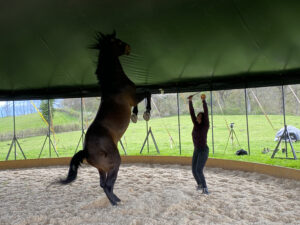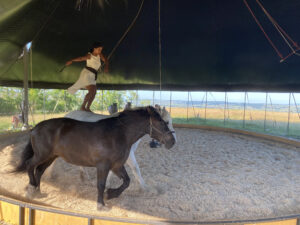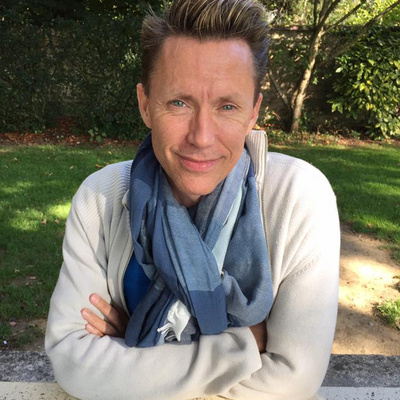Explorations of Research and Creation with Charles Batson – Relationships Between Humans & Non-Human Animals
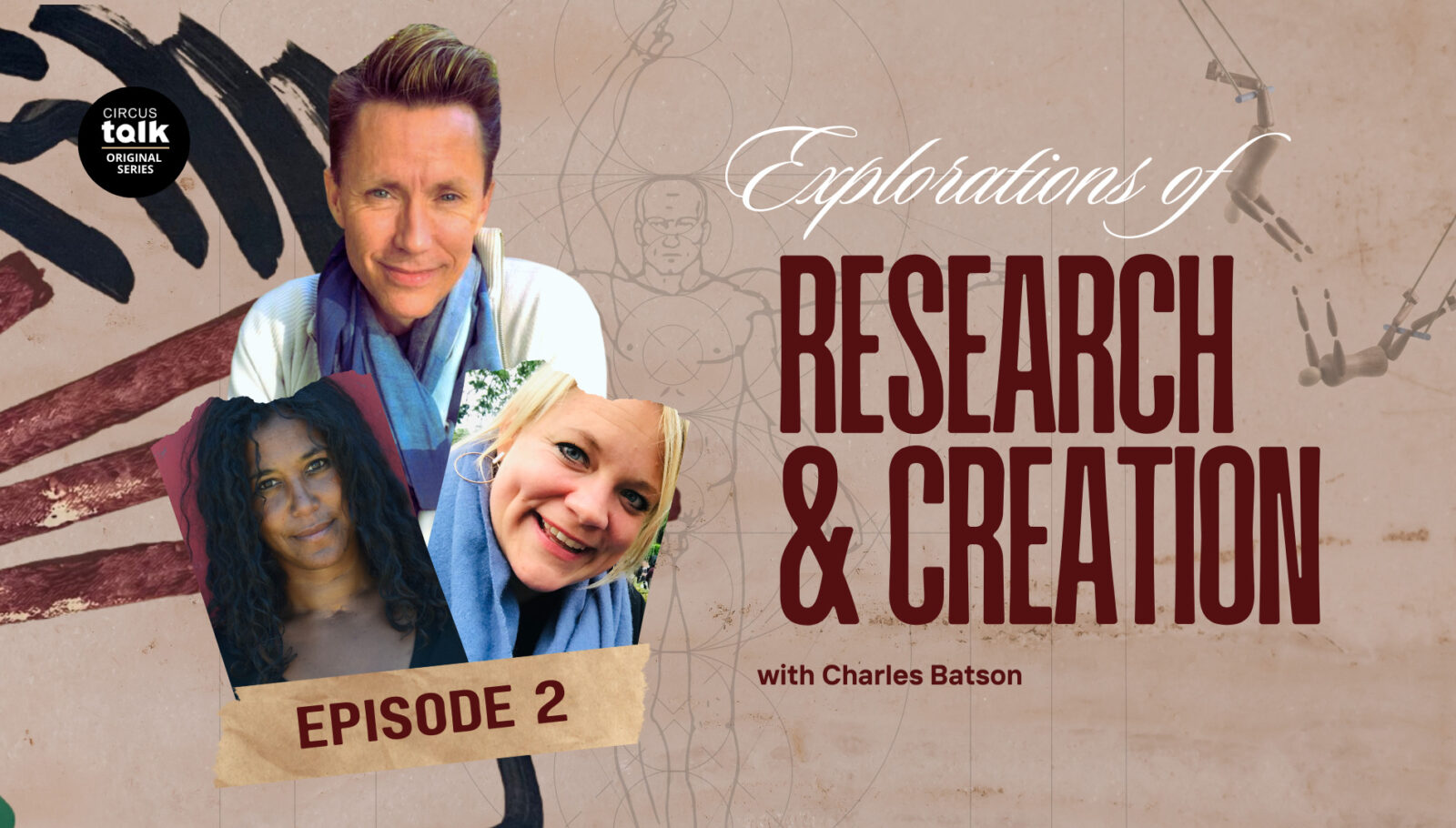
CircusTalk is pleased to present “Explorations of Research and Creation with Charles Batson.” A series dedicated to provocative dives into where research and creation meet in the development of intriguing art, this series is designed to showcase experiences in how creative processes and research questions guide, inform, and give a spark to stimulating work. Join us for this four-episode journey from across our many circus worlds!
“You never bring something into the world without having a context, without having done research on what you’re doing. Both are bringing something to society.”
In this second episode, Batson delights in a conversation with equestrian artist Sabrina Sow and researcher Franziska Trapp as they speak about their collaborative research-creation project: an exhibition soon forthcoming in the research catalogue of the Journal for Artistic Research. Their provocatively lively voices here tell us about theirfascinating melding of energy, drive, artistry, and question-building as they explore together relationships among animals, both non-human and human,as they crafted their project called “The non-human animal artist. Toward the presentation of an artistic species companionship,” supported by a major grant from France’s General Direction of Artistic Creation.
Watch as they tell us how, as a newly formed creation-research duo, they found their languages, vocabularies, and strategies expand, grow, and develop, pointing both to change, challenge, and encouragement. As with others in this series, they tell us what they consider to be the power of these things we call “research” and “creation” and what circus creatives can uncover and build through deep explorations into both of these things.
How, indeed, is meaning created in contemporary circus performances? How do we create relationships within and across species? How do we change perspectives, to dig into the world of the other? And, importantly, how do researchers and creators find each other, and find both impulses within themselves? Trapp and Sow tell us. You’ll want to listen.
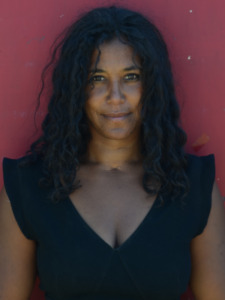 Sabrina Sow
Sabrina Sow
Circographer, trainer, flyer, poet
After an intense academic path in 2003, Sabrina devoted herself to her passion: horses. From the world of competition to that of show business, she has sailed and glided with different masters of the work. She founded the Compagnie Equinoctis in 2006 to develop a style of writing that questions social relationships. The company created twenty or so creations over the course of the company’s migrations, and settled in France in 2011. In France, Sabrina is co-founder of “La Bonnette, lieu permaculturel,” whose avowed aim is to bring the living together. This private 40-hectare site of bocage and grove, typical of southern Burgundy, is home to her show company, big top, and 14 horses, 3 dogs and 3 cats, as well as a host of undomesticated living creatures.
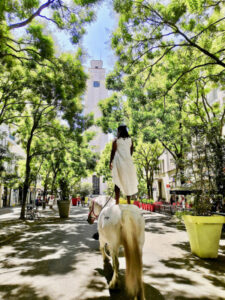
She is also founder of the publishing house les Editions de l’Espèce, set up thanks to a grant from the Fondation Beaumarchais, the secretary of the syndicat des cirques et compagnies de création (union of circuses and creative companies), which enables her to represent the voice of small performing arts companies in the field of paritarianism and is also the author of a book entitled “La Négresse à Cheval” (The Negress on Horseback), in which she describe how her relationship with horses and with live performance in general has enabled her to create an effective shell against racism and sexism.
 Franziska Trapp
Franziska Trapp
Circus Researcher
Dr. Franziska Trapp is a postdoctoral researcher at the Université Libre de Bruxelles, Belgium. She is the founder of Circus | Studies and organizer of international conferences, including Semiotics of the Circus (2015), UpSideDown—Circus and Space (2017), Semaine du Cirque (2020), and Écrire l’histoire du cirque (2022) and editor of the recently published anthology 360° Circus. Meaning. Practice. Culture (Routledge 2023). Trapp has worked for various circus productions such as the Festival Mondial du Cirque de Demain (FR) and Cirque Bouffon (DE) and collaborated as a dramaturge with Tall Tales Company (NL), Sysmo (BE), Julia Berger (DE) among others. She was awarded third place asGermany’s Best Junior Research Talent of 2019 (Academics/Die Zeit) and received theDGS Young Researchers Price 2020 (German Association of Semiotics) for her book entitledReadings of Contemporary Circus. A Dramaturgy (De Gruyter 2020, Routledge 2024 (EN)).
Charles Batson is proud to identify as a circademic. A circus, theatre, and dance researcher and sometime practitioner, as well as Professor of French and Francophone studies at Union College (Schenectady, NY, USA), Batson may best be known here at CircusTalk for the “Journeys Through Queer Circus” series, for the international research project Circus and its Others, and for publications such as the co-edited volume Cirque Global: Quebec’s Expanding Circus Boundaries.
References and links to supplement…
The teaser for “Dresse-toi” (fascinatingly ambiguously translated as “Get up,” or “Tame yourself”), the production Sabrina Sow mentions in the interview.

Want to explore further? Check out the other episodes of Explorations of Research and Creation here!
All photos graciously shared by the creators.Editor's Note: At StageLync, an international platform for the performing arts, we celebrate the diversity of our writers' backgrounds. We recognize and support their choice to use either American or British English in their articles, respecting their individual preferences and origins. This policy allows us to embrace a wide range of linguistic expressions, enriching our content and reflecting the global nature of our community.
🎧 Join us on the StageLync Podcast for inspiring stories from the world of performing arts! Tune in to hear from the creative minds who bring magic to life, both onstage and behind the scenes. 🎙️ 👉 Listen now!
